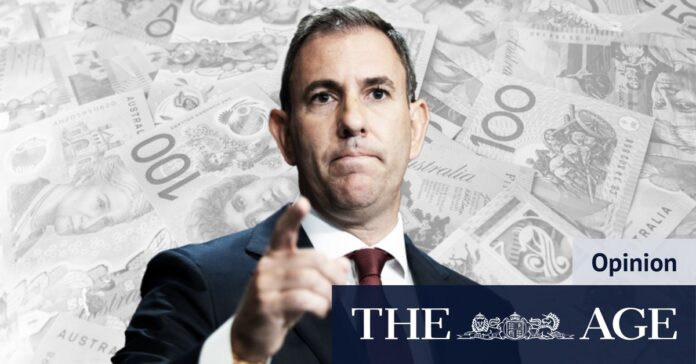[ad_1]

Is Jim Chalmers turning a blind eye to what’s around the corner for the Australian economy?Credit: Alex Ellinghausen
Take workplace re-regulation: new industrial laws to restore union bargaining muscle, increase wages by diktat and crack down on existing workplace flexibilities reflect Labor’s desire to curry favour with the unions, which account for not even 10 per cent of the private workforce.
Appeasement of the Maritime Union of Australia just allows the labour waterfront monopoly to impose costs on the economy that punish the rest of the workforce.
All this is a step back to Australia’s old IR club, with its legal protections of union power that preceded the Hawke-Keating prosperity-enhancing reforms of the 1980s.
Or take energy policy. It is one thing to legislate overly ambitious carbon emissions targets, it is another to revert to more interventionist government direction at an open-ended cost to deliver the required investment in large-scale renewables. That will lead to not just further price rises and less reliable base-load power, but, as former Productivity Commission head Gary Banks warns, price controls and other regulatory interventions that will just exacerbate supply side problems.
Meanwhile, in supporting the redistribution of income from the most highly taxed Australians to the less taxed by reshaping the stage 3 tax cuts, the government puts obstacles in the way of the efficiency and productivity Chalmers claims to prize.
Loading
Chalmers has simply resorted to a strategy of banking on inflated commodity export prices and income tax bracket creep that will – while it lasts – bring with it rising tax revenues and relief to the national finances. Ponder that: a government that wants to decarbonise the economy relies on the mining and fossil fuel export sector to keep replenishing the coffers. But what happens when the resources boom ends?
The Reserve Bank knows what needs to be done, but no one in Canberra dares to do it: revive the economy through boosting its productive sectors and make the necessary cuts in the major spending programs, such as the unsustainable NDIS and Gonski schools funding that has not stopped classroom performance going backwards. There is no sign that Chalmers is having any success on these fronts – and maybe he is not even trying.
Free-spending budgets might sound reassuring to some people. But the costs will continue to be paid by our children and grandchildren. There is, after all, no such thing as a magic money tree — that growth is a given, that budgets don’t need to be balanced or that money can be borrowed indefinitely to subsidise unlimited spending.
Alas, the Coalition has not come close to recognising the gauntlet Chalmers has thrown down to it. Unless the opposition can discover a radical message of its own to distinguish itself, we should prepare to live under Chalmers’s radicalism for a long time to come.
If that happens – and our living standards further deteriorate – it is not just the political class that is in trouble. All of us will face very dark times indeed.
Tom Switzer is executive director of the Centre for Independent Studies.
[ad_2]
Source link


